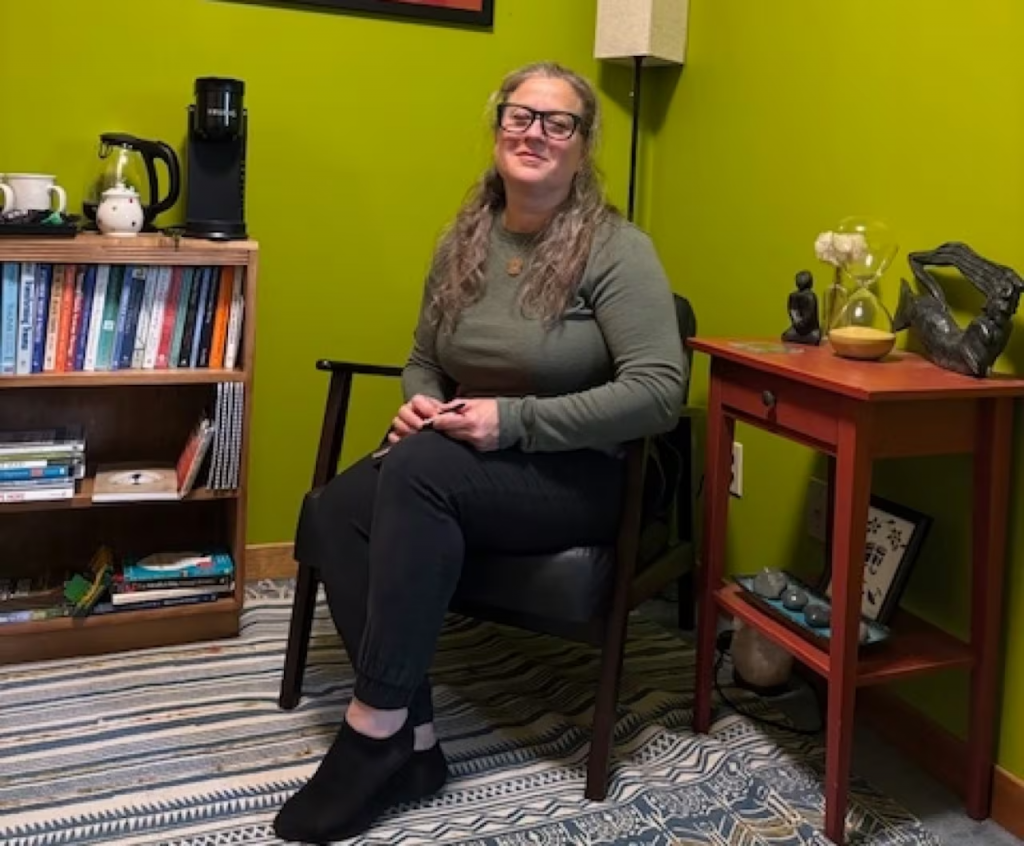Iqaluit therapist pushes for Nunavut’s private practitioners to be part of counselling service

All therapists contracted by the government’s service live outside the territory
A mental health therapist is calling on the Nunavut government to allow private practitioners who live in the territory to be able to provide therapeutic support through the federal Non-Insured Health Benefits program.
Nunavut’s Department of Health runs a program called Healing by Talking, which connects people in Nunavut with therapists virtually. Inuit using federal Non-Insured Health Benefits (NIHB) can see a therapist through the program, with NIHB covering 22 sessions per year.
All of the current providers contracted by Healing by Talking live outside of Nunavut, according to the Department of Health, and all services are offered virtually.
No Nunavut-based capacity
Rachel Hollingshead is a social worker who has lived in Iqaluit for the last 13 years. She worked in mental health for the Nunavut government for a decade before starting her private practice in Iqaluit.
Hollingshead said she wants to accept NIHB from her clients, but she can’t because she is not contracted by Healing By Talking.
That’s because Indigenous Services Canada, which provides NIHB funding, has a contribution agreement with Nunavut to administer these funds.
“As outlined in the funding agreement, NIHB reimburses expenditures for NIHB-eligible clients to access Healing by Talking,” a spokesperson for Indigenous Services Canada said in an email to CBC News.
“Service providers interested in providing mental health counselling services in Nunavut can enquire about opportunities directly with the government of Nunavut.”

Hollingshead said that’s easier said than done. She sent her CV to the program more than a year ago, and said she was told there weren’t any service gaps needing to be filled.
Building future support
Hollingshead said she’s also concerned that people studying to be social workers at Nunavut Arctic College might not be able to easily access NIHB funding if they want to open a private practice.
According to Indigenous Services Canada, there were 38,000 people in Nunavut eligible for NIHB in 2024.
Nunavut and the N.W.T. are the only jurisdictions in Canada that have contribution agreements with the federal government to administer NIHB for mental health counselling.
Hollingshead said she doesn’t want to turn away clients who are seeking her support and eligible for NIHB.
“I just want to be able to support the people who feel like I’m the right fit for them and are ready to access the kind of support that I can offer,” she said.
The Pulaarvik Kablu Friendship Centre in Rankin Inlet offers counselling and healing programs to Inuit in the region. Unlike private practitioners, Pulaarvik is funded directly by the Nunavut government and Indigenous Services Canada, separate from NIHB.
“Although if NIHB referred clients … we would accept all inquiries for counselling support to our communities in our region,” Pelagie Sharp, Pulaarvik’s executive director, wrote in an email to CBC.
Changes could be coming
Camilla Sehti, Nunavut’s director of mental health and addictions, said the territory’s Health department is rolling out a second phase of Healing by Talking to create more community-based support.
She also said if clients want to see someone outside of the program, they can write to the department for a referral, “if they’re operating a private practice and they’re seeing NIHB-eligible people.”
Hollingshead said she’s asked the department for an exception, but was told it can only be made for certain clients with whom she’s had a longstanding relationship.
Sehti said the therapists who work with Healing by Talking are usually specialized in different forms of therapy.
“You may not find a child and attachment therapist in Nunavut. We actually don’t have any that really focus on how we work in that area with people,” Sehti said. “So we really look at how we build, hire and staff based on where the current needs are.”
Indigenous Services Canada also told CBC News in an email it’s looking at “exploring other service delivery models” with the Nunavut government and Inuit partner organizations.
Sehti said 5.4 per cent of eligible Nunavummiut use Healing by Talking.
“Obviously it would be ideal if we had a bunch of people living in Iqaluit that were a Healing by Talking therapist and were able to fill those gaps and provide those specialties,” Sehti said. “But we don’t have that.”
Hollinghead said she understands the need to pull in support from outside the territory.
“It’s always been a necessity up here, especially in health care,” she said.
“My issue is why would you do that to the exclusion of somebody here on the ground who’s being asked for that support? Why not capitalize on building some Nunavut-based capacity?”
Related stories from around the North:
Canada: Inuvik hospital workers decry loss of weekend mental health services, emails show, CBC News
Finland: Climate change worries Finland’s young reindeer herders, Yle News
United States: Craft space aims to teach Alaska Indigenous women skills — and help beat addiction, Alaska Public Media



